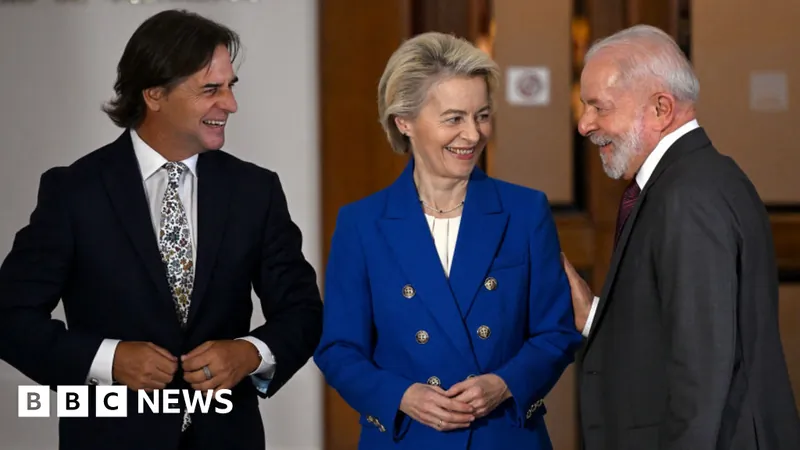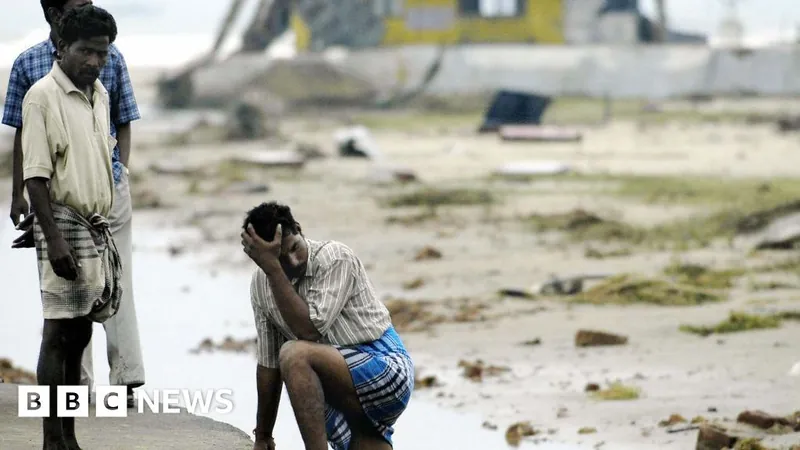
EU Strikes Groundbreaking Trade Deal with South America: A Game Changer for Global Markets!
2024-12-06
Author: Michael
EU Strikes Groundbreaking Trade Deal with South America: A Game Changer for Global Markets!
In a landmark development, the European Union (EU) has inked a significant trade agreement with four of South America's largest economies: Argentina, Brazil, Paraguay, and Uruguay. European Commission President Ursula von der Leyen hailed the deal as a 'truly historic milestone,' especially in an increasingly confrontational global landscape.
This new agreement aims to replace a previous deal from 2019, which never materialized due to the reluctance of some EU member states to ratify it. If this latest accord gains approval from all EU nations, businesses across the two regions will benefit from reduced tariffs, streamlined customs processes, and enhanced access to vital raw materials.
'We are paving the way for more jobs, better choices, and favorable prices for our citizens,' Ms. von der Leyen declared to journalists in Montevideo, emphasizing the positive implications for both economies.
Last year, trade between Europe and the aforementioned South American nations reached substantial figures, with Europe exporting nearly $59 billion worth of goods, including vehicles, machinery, chemicals, and pharmaceuticals. In return, South America shipped approximately $57 billion worth of products to Europe, notably minerals like lithium and nickel, which are essential for manufacturing batteries in electric vehicles (EVs). Given the increasing demand for EVs, this trade agreement is strategically timed, offering European carmakers easier access to these critical resources.
With the combined population of the EU and Mercosur exceeding 700 million and representing around 20% of the global economy, leaders on both sides are optimistic about the potential growth opportunities this deal could unlock.
Moreover, approximately 60,000 EU companies are already exporting to Mercosur members, with a significant portion being small and medium-sized enterprises (SMEs). This highlights the deal's importance in supporting diverse businesses and bolstering economic ties.
However, the path to ratification is not without challenges. France, Italy, and Poland have raised concerns about potential competition disparities, particularly around environmental standards, agricultural practices, and deforestation. French Trade Minister Sophie Primas stressed the need for cautious negotiations, implying that 'the signing in Montevideo does not legally bind member states.' She reiterated France's commitment to advocate for its agricultural sector's interests.
The situation in South America has also shifted since the initial talks began in 2000. Changes in leadership in Brazil and Argentina appear to have addressed some previous environmental concerns, adding a layer of optimism to the current negotiations.
Uruguay's President Luis Lacalle Pou, who facilitated the final discussions, acknowledged that while obstacles remain, the deal is vital for the smaller economies of Mercosur in an increasingly interconnected world.
As Germany grapples with economic slowdowns and pressures on its exporters, this trade deal is seen as a crucial opportunity. A government spokesperson emphasized the need to seize this 'unique opportunity' while stressing collaboration to address concerns from other member states.
As this trade agreement moves through the ratification process, all eyes will be on the EU to ensure a balance between economic growth and sustainable practices. Stay tuned as this dynamic situation continues to evolve—will the EU and South America redefine global trade in our lifetime?









 Brasil (PT)
Brasil (PT)
 Canada (EN)
Canada (EN)
 Chile (ES)
Chile (ES)
 España (ES)
España (ES)
 France (FR)
France (FR)
 Hong Kong (EN)
Hong Kong (EN)
 Italia (IT)
Italia (IT)
 日本 (JA)
日本 (JA)
 Magyarország (HU)
Magyarország (HU)
 Norge (NO)
Norge (NO)
 Polska (PL)
Polska (PL)
 Schweiz (DE)
Schweiz (DE)
 Singapore (EN)
Singapore (EN)
 Sverige (SV)
Sverige (SV)
 Suomi (FI)
Suomi (FI)
 Türkiye (TR)
Türkiye (TR)